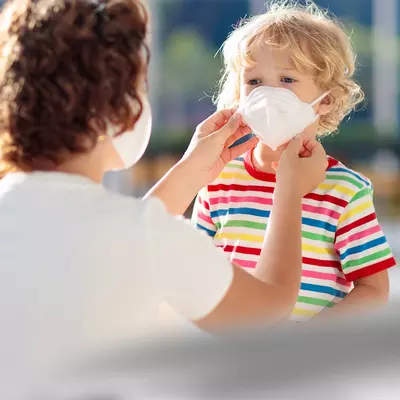- AdventHealth

As the spread of COVID-19 continues around the nation and the world, researchers are gathering information from cases to understand the severity of the disease and the spectrum of symptoms. According to the Centers for Disease Control and Prevention (CDC), there is a growing correlation between the virus and the development of blood clots.
Some types of blood clots are good. For example, if you cut your hand, blood cells clot in the area to protect the wound and stop blood loss. Once your injury has healed, the clot dissolves, making a small piece of protein called D-dimer.
But in the absence of injury, increased D-dimer levels could mean that blood clots are present.
When Blood Clots Are a Problem
A dangerous pattern seems to be emerging in some patients with coronavirus. Researchers are reporting increased levels of D-dimer in some patients’ blood, despite no obvious sign of injury.
One study involving seven COVID-19 patients in critical condition found increased levels of D-dimer and fibrinogen in most of those patients. Fibrinogen is another protein involved in forming blood clots.
Another study of 5,700 patients hospitalized with COVID-19 found that more than half had increased D-dimer levels, some more than three times the regular range.
The presence of D-dimer may signal a blood clotting disorder, meaning clots form even without an injury or they don’t dissolve when they should. These clots could cut off the blood supply to vital organs, including the liver, brain and kidneys, leading to severe injury or even death.
What Can Be Done About Blood Clots?
Just being in the hospital and immobile can increase the risk of a blood clot forming in a vein, a condition known as venous thromboembolism (VTE). To reduce that risk, the World Health Organization (WHO) recommends that critically ill COVID-19 patients receive blood-thinning medication or therapy with a compression device if blood-thinning medication isn’t an option.
It’s not yet known whether these patients in the hospital may benefit from more aggressive anticoagulation treatment beyond therapy for VTE. Another treatment being evaluated is tissue plasminogen activator (tPA), which is a drug used to help treat stroke that works by dissolving blood clots to improve blood flow.
The American Society for Hematology (ASH) recommends that health care providers monitor patients’ platelet count, D-dimer, fibrinogen and PT/aPTT, which is a screening test that helps evaluate the body’s ability to appropriately form blood clots. By watching out for blood clotting and being proactive, it’s hoped that health care providers may be able to prevent this possible complication in patients hospitalized with severe COVID-19.
Protect Yourself From COVID-19 Complications
To protect yourself from serious COVID-19 complications, such as possible blood clots, your best bet is to do what you can to stay healthy. The CDC recommends:
- Cleaning and disinfecting high-touch areas, such as phones and doorknobs
- Covering your coughs and sneezes
- Staying at least six feet from others
- Staying home as much as possible
- Washing your hands often for at least 20 seconds
- Wearing a cloth face mask when you’re out in public
Who’s High Risk for COVID-19 Complications
According to the CDC, older adults and people of any age who have serious underlying medical conditions might be at higher risk for severe illness from COVID-19. These conditions include:
- Chronic lung disease or moderate to severe asthma
- Chronic kidney disease
- Diabetes
- Liver disease
- Serious heart conditions
Risk is also high for people who are:
- Immunocompromised
- Living in nursing homes or long-term care facilities
- Severely obese
If you’re at higher risk for serious illness because you have an underlying medical condition, it’s important to continue taking your medications exactly as prescribed and stay in touch with your physician. The CDC recommends not changing your treatment plan without first talking to your doctor.
What to Do If You Have Symptoms of Coronavirus
If you begin to feel symptoms of COVID-19, such as dry cough, fever or shortness of breath, contact your physician or make an appointment for a video visit using our secure AdventHealth app.
You can access the AdventHealth app via a computer or mobile device, such as a tablet or smartphone. Simply download the app from the Google Play Store or the Apple App Store.
We’re Here to Help
With all the news and discussion around the coronavirus pandemic, it can be difficult to know where to turn. We’re here to support your family with whole-health care and important updates. Visit our Coronavirus Resource Hub to learn more.



